From Up on Poppy Hill
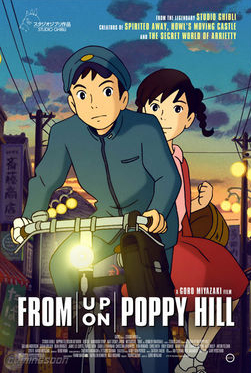
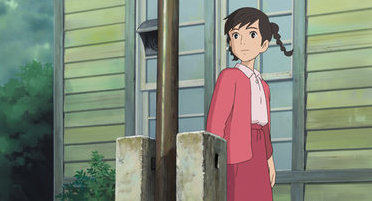 Like all of the recent Studio Ghibli efforts that have made their way to American movie screens (the previous one being last year's The Secret World of Arrietty), the movie has been dubbed in English, and features a fine cast of talented actors including Sarah Bolger, Anton Yelchin, Gillian Anderson, Beau Bridges, and Jamie Lee Curtis. Usually watching foreign films dubbed in English irritates me to no end, but this is a very fine effort. There's a sense of care here, both in the performances, and in the English script translation. And as with all Ghibli productions, the watercolor artwork and attention to detail in the settings (this time recreating Japan in the early 1960s, as it geared up to host the '64 Olympics) is nothing short of stunning. And yet, despite the usual attention to quality, this is a very different film for Ghibli. There are no supernatural elements to be found, and the pace can be downright glacial at times, due to the fact that this is a very basic love story about two ordinary people. This both works for and against the film.
Like all of the recent Studio Ghibli efforts that have made their way to American movie screens (the previous one being last year's The Secret World of Arrietty), the movie has been dubbed in English, and features a fine cast of talented actors including Sarah Bolger, Anton Yelchin, Gillian Anderson, Beau Bridges, and Jamie Lee Curtis. Usually watching foreign films dubbed in English irritates me to no end, but this is a very fine effort. There's a sense of care here, both in the performances, and in the English script translation. And as with all Ghibli productions, the watercolor artwork and attention to detail in the settings (this time recreating Japan in the early 1960s, as it geared up to host the '64 Olympics) is nothing short of stunning. And yet, despite the usual attention to quality, this is a very different film for Ghibli. There are no supernatural elements to be found, and the pace can be downright glacial at times, due to the fact that this is a very basic love story about two ordinary people. This both works for and against the film.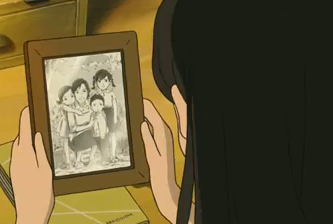 But before I go into too much detail about that, I should discuss the plot. Our heroine is Umi (voice by Sarah Bolger), a teenage girl who lives in a boardinghouse with her grandmother, and helps her run and manage the building. We learn early on that her mother is away studying in the US, while her father was a sailor in the Japanese military who was killed in the Korean War. The boardinghouse overlooks the sea, and each morning, Umi raises flags outside the house, wishing the many boats that pass by safe travels. At school, Umi is introduced to a young man named Shun (Anton Yelchin), who works for the school paper, and spends most of his time in a dilapidated old clubhouse on school grounds that houses not only the school newspaper, but also archeology club, chemistry club, and philosophy club, just to name a few. The building is scheduled to be demolished, and all the different clubs that inhabit it begin a valiant effort to convince the school board to save the old building.
But before I go into too much detail about that, I should discuss the plot. Our heroine is Umi (voice by Sarah Bolger), a teenage girl who lives in a boardinghouse with her grandmother, and helps her run and manage the building. We learn early on that her mother is away studying in the US, while her father was a sailor in the Japanese military who was killed in the Korean War. The boardinghouse overlooks the sea, and each morning, Umi raises flags outside the house, wishing the many boats that pass by safe travels. At school, Umi is introduced to a young man named Shun (Anton Yelchin), who works for the school paper, and spends most of his time in a dilapidated old clubhouse on school grounds that houses not only the school newspaper, but also archeology club, chemistry club, and philosophy club, just to name a few. The building is scheduled to be demolished, and all the different clubs that inhabit it begin a valiant effort to convince the school board to save the old building.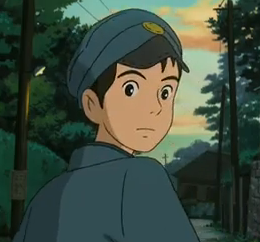 Umi becomes involved in Shun's struggle to save the building when she starts helping him out on the paper, and offering her assistance in cleaning up and restoring the broken down old clubhouse, so that the school will take their efforts to save it more seriously. As the two spend time together after school, a friendship builds, and soon that friendship starts leading to bigger feelings. That's right about the time that the two make a startling revelation that they may share a family history together, and that they may be half-siblings. Rather than play up the drama of the situation, the screenplay by Miyazaki and Keiko Niwa takes a surprisingly laid back take on this revelation, even having one of the characters comment that the whole thing "is like a cheap melodrama". Faced with this situation and the tangled feelings he has for Umi, Shun glumly comes to the conclusion that they will just have to stop feeling how they do for each other.
Umi becomes involved in Shun's struggle to save the building when she starts helping him out on the paper, and offering her assistance in cleaning up and restoring the broken down old clubhouse, so that the school will take their efforts to save it more seriously. As the two spend time together after school, a friendship builds, and soon that friendship starts leading to bigger feelings. That's right about the time that the two make a startling revelation that they may share a family history together, and that they may be half-siblings. Rather than play up the drama of the situation, the screenplay by Miyazaki and Keiko Niwa takes a surprisingly laid back take on this revelation, even having one of the characters comment that the whole thing "is like a cheap melodrama". Faced with this situation and the tangled feelings he has for Umi, Shun glumly comes to the conclusion that they will just have to stop feeling how they do for each other.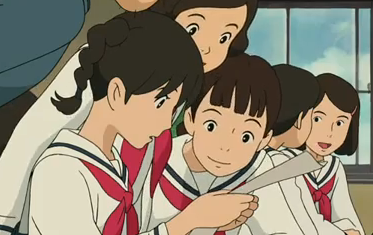 The way that From Up on Poppy Hill handles its central crisis is both a pro and a con. On one hand, it is nice that the movie tackles its tricky situation in a mature way. Rather than playing up the drama, the movie successfully displays the heartache of the two young leads, while at the same time not playing it up to the point that it feels like the movie is hitting us over the head. These are two simple kids with a lot of mixed up emotions, and the film does a great job of conveying that. The whole time I was admiring this aspect, however, I also found myself getting a little restless as the film went on. Umi and Shun are very nice and pleasant people, but not exactly engaging ones. I liked them, but also felt they were perhaps a bit too laid back at times. Their struggle to save the school clubhouse never grabbed me as much as it should, and their relationship before the revelation was not as strong as it should be to carry the desire that we want to see something work out in the end.
The way that From Up on Poppy Hill handles its central crisis is both a pro and a con. On one hand, it is nice that the movie tackles its tricky situation in a mature way. Rather than playing up the drama, the movie successfully displays the heartache of the two young leads, while at the same time not playing it up to the point that it feels like the movie is hitting us over the head. These are two simple kids with a lot of mixed up emotions, and the film does a great job of conveying that. The whole time I was admiring this aspect, however, I also found myself getting a little restless as the film went on. Umi and Shun are very nice and pleasant people, but not exactly engaging ones. I liked them, but also felt they were perhaps a bit too laid back at times. Their struggle to save the school clubhouse never grabbed me as much as it should, and their relationship before the revelation was not as strong as it should be to carry the desire that we want to see something work out in the end.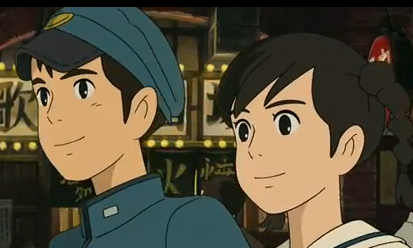 What interested me far more was the overall theme of the film, which deals with the after effects of war on a nation, and how the pasts of these two teenagers gradually comes into light. The film introduces the idea of tradition vs. modernization in the struggle to save the clubhouse, but there is a deeper undercurrent with the setting, and how Japan is preparing to host the 1964 Olympics, and show the world how it has been rebuilt after its tragic past. The past also ties into the main characters, as secret histories of war, death, and childbirth threaten to tear Umi and Shun apart before their relationship can even begin. This is what gets us involved, not necessarily the two teens themselves. The sad family history provides the drama that the present day love story lacks.
What interested me far more was the overall theme of the film, which deals with the after effects of war on a nation, and how the pasts of these two teenagers gradually comes into light. The film introduces the idea of tradition vs. modernization in the struggle to save the clubhouse, but there is a deeper undercurrent with the setting, and how Japan is preparing to host the 1964 Olympics, and show the world how it has been rebuilt after its tragic past. The past also ties into the main characters, as secret histories of war, death, and childbirth threaten to tear Umi and Shun apart before their relationship can even begin. This is what gets us involved, not necessarily the two teens themselves. The sad family history provides the drama that the present day love story lacks.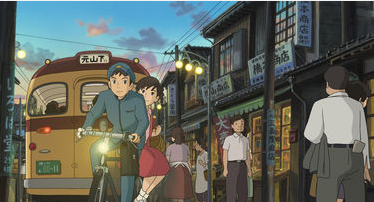
See the movie times in your area or buy the DVD on Amazon.com!






0 Comments:
Post a Comment
<< Home